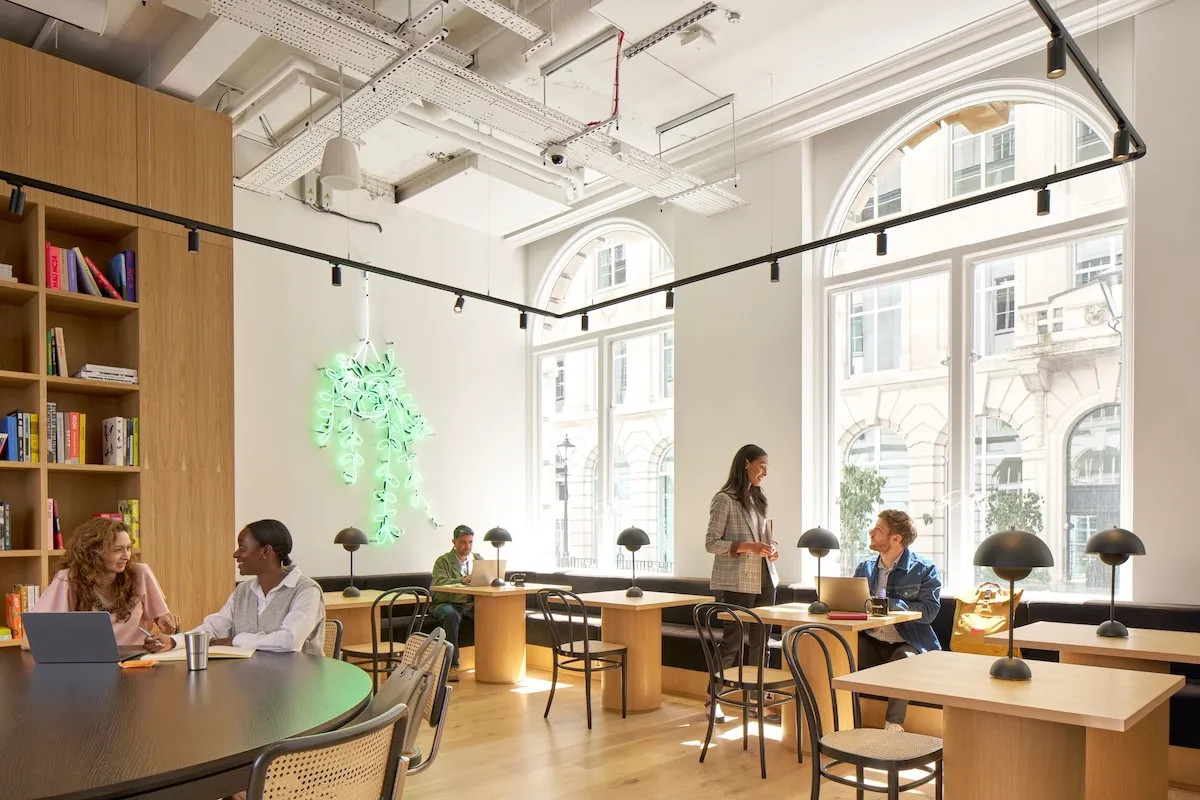Inspiration can sometimes seem to be entirely out of our control. You can’t command your brain to come up with a great idea or an ideal solution to a problem, just as much as you can’t simply decide to feel creative one afternoon.
Feeling inspired in life and at work is an important part of sustaining motivation, and a lack of inspiration might be a clue that something else is going wrong. But while inspiration might be elusive at times, there are still plenty of strategies we can use to encourage it to strike more often.
Having an inspiring office space that’s been designed around your needs is just one way. WeWork provides beautifully designed workplace solutions built with flexibility in mind and designed to encourage creativity and innovation, in locations around the world.
For even more flexibility, WeWork All Access and WeWork On Demand lets you and your team access workspaces and meeting rooms in hundreds of locations across multiple cities, allowing everyone to do their best work wherever they are.
Let’s take a closer look at the concept of inspiration, where it comes from, and how it can benefit people in their daily lives. We’ll also share a few of our favorite inspirational quotes. But first, let’s try to define the word itself.
What is the definition of inspiration?
Inspiration can mean a few different things. It can describe the process of being overcome by a spontaneous urge to do something creative or important—that eureka moment when the way forward becomes suddenly obvious to you. Or it can describe the act of imparting that motivation to somebody else through your words and actions.
Coming from the Latin inspirare, meaning “to breathe into,” the word inspiration was originally used in a divine context to mean a kind of mystical animating force, a profound idea or truth revealed to an unsuspecting person. This is why inspiration is often said to “strike” out of nowhere, as though the feeling itself were a bolt of lightning from a heavenly muse.
But inspiration can also refer to the source of these new ideas, an intangible well of potent creativity that we can tap into with a little practice. This is the type of inspiration you can set out to find, rather than waiting for it to pop into your head as you’re lying awake in bed at 3 a.m.
Benefits of inspiration
Though research into the psychology of inspiration is relatively thin, most agree that inspiration is not a supernatural force. In everyday usage, “inspiration” is a broad label we apply to any number of unrelated mental processes. And far from anything as mysterious as divine intervention, the sensation of being inspired is generally understood to come from somewhere within ourselves.
The benefits of inspiration, however, are well understood by most people. Feeling inspired in your day-to-day life can play a key role in unlocking creativity, increasing productivity, and boosting happiness. People who regularly feel inspired at home and at work tend to be more engaged, more confident, and more motivated to solve problems and create new things.
Why is inspiration so important in life and work?
The peculiar feeling of being suddenly inspired by a new idea can seem random and unpredictable. But a sense of inspiration has been theorized to be the result of our minds processing new information in the context of things we already know, a lot like discovering a single jigsaw piece that connects two completed parts of a picture.
That means it’s possible to encourage inspiration through your intentional actions, rather than waiting around for it to happen spontaneously. For example, learning more about subjects unrelated to your area of expertise, while maintaining a curious attitude and an open mind, can help you increase the chances of recognizing patterns and links between seemingly disconnected concepts.
This happens to be why the notion of sudden inspiration is a persistent theme in popular mathematics. Mythologized discoveries don’t appear out of nowhere, but nearly always stem from brilliant minds connecting two disparate branches of math in previously inconceivable ways. To quote G.H. Hardy in A Mathematician’s Apology: “A mathematician, like a painter or poet, is a maker of patterns. If his patterns are more permanent than theirs, it is because they are made with ideas.”
No matter which field you are in, inspiration can kickstart our inherent ability to visualize a tricky problem from a novel perspective, or to think outside the box. The more flexible your style of thinking, the more receptive you are to inspiration and the better equipped you’ll be to counter unexpected problems with innovative solutions.
How to help yourself get inspired
- Listen to music. When you’re focusing too hard on a problem or dilemma, it’s easy to fall into a repetitive mental routine of running through a list of the same potential solutions over and over again, and realizing that none of them will work. As a tool, the right music can help your mind disengage from these unhelpful loops and spot new ideas you might have otherwise overlooked.
- Read a book. Literature is the most valuable source of knowledge we have, but as well as being stores of information, great books can also prompt us to think about situations from the perspective of another person or culture. The simple act of approaching a narrative from another angle is a form of empathetic thinking that can trigger moments of inspiration.
- Get physical activity. Some studies have found that healthy and happy people experience inspiration more readily than those who feel anxious or stressed. Exercise is known to improve physical and mental health, and in addition to offering some space to clear your mind and process your thoughts, physical activity can help trigger the creative process.
- Speak to people. Open-mindedness, honesty, and a willingness to share and listen to new perspectives can all play an important role when seeking out inspiration. Studies into where ideas come from have suggested that new ideas can be influenced by our social environments. That is to say, new ideas might be our subconscious minds remixing our friends’ ideas into something new, so strike up a conversation.
- Watch a movie. Whether it’s an epic that leaves you feeling overwhelmed by the weight of your own emotional response, or it’s just Bridesmaids for the seventh time, watching a movie can place you in a focused state of mind and act as a starting point for the creative process.
Inspirational quotes
The best inspirational quotes are short nuggets of wisdom that inspire you to think about the world or yourself in a new way. Here are a few of our favorites:
“You can’t use up creativity. The more you use, the more you have.” —Maya Angelou
“Don’t spend time beating on a wall, hoping to transform it into a door.” —Coco Chanel
“The grass is greener where you water it.” —Neil Barringham
“We are what we pretend to be, so we must be careful about what we pretend to be.” —Kurt Vonnegut
“If you don’t turn your life into a story, you just become a part of someone else’s story.” —Terry Pratchett
“When money, rather than innovation or value, is your competitive advantage, that’s when things get boring and stagnant, and monopolies take root.” —Hank Green
Steve Hogarty is a writer and journalist based in London. He is the travel editor of City AM newspaper and the deputy editor of City AM Magazine, where his work focuses on technology, travel, and entertainment.
Rethinking your workspace?










